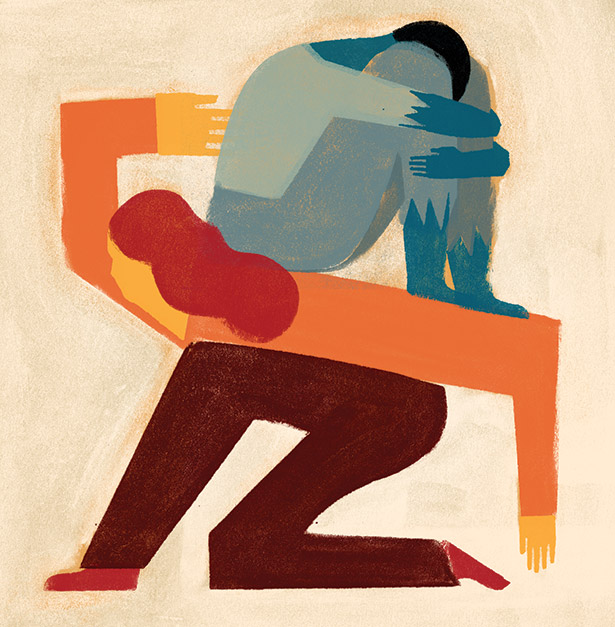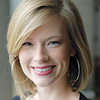Grace Note Reflections on the Christian Life
Go Where Your Heart Is on Fire
We Can All Help Improve the World’s Health
By Kristen Eddings ’06 | Illustration by Keith Negley
 It was on a Seattle Pacific Reachout International (SPRINT) trip to Sierra Leone in 2005 where I first saw a man with leprosy, permanently disfigured, begging outside a grocery store. I hurried past him, concerned that if he touched me I would contract leprosy. Our SPRINT team piled back into the van to drive the washed-out streets of Marjay Town to return to the orphanage we were serving. Meanwhile the image of the man with leprosy didn’t leave my mind. Could I have helped him?
It was on a Seattle Pacific Reachout International (SPRINT) trip to Sierra Leone in 2005 where I first saw a man with leprosy, permanently disfigured, begging outside a grocery store. I hurried past him, concerned that if he touched me I would contract leprosy. Our SPRINT team piled back into the van to drive the washed-out streets of Marjay Town to return to the orphanage we were serving. Meanwhile the image of the man with leprosy didn’t leave my mind. Could I have helped him?
Three years later, as a job hunter, I sat in the office of Scott Jackson, then vice president of external relations at PATH, discussing global health. I had recently read Mountains Beyond Mountains, Tracy Kidder’s biography of the founder of Partners in Health, Paul Farmer. A doctor at Brigham and Women’s Hospital and a teaching affiliate for Harvard Medical School, Farmer regularly traveled to Haiti to serve a population that couldn’t pay him. My heart caught fire, and I was inspired by his determination to do anything to provide care for the poor.
As Scott and I discussed whether someone who isn’t a doctor can contribute to what the world deems “the least of these,” it became clear that I could do something.
My mission field wouldn’t include tent clinics in destinations only U.N. vehicles could access. My mission field would, in fact, be behind a desk at the Washington Global Health Alliance.
I was hired at WGHA in 2008. Now my contribution to global health is to help others discover how they can improve the health and well-being of the world’s most vulnerable populations by using their unique gifts. Accountants, graphic designers, product managers, moms, and soccer players all have something to give.
For example, I have seen a lawyer organize people of multiple faiths to talk about how to improve care in different cultural contexts; an Amazon manager lead his team to build a wall-sized interactive display for a maternal health fundraiser; and middle school students create and teach lessons about clean water and proper sanitation in elementary school assemblies. What I love about these stories is that these individuals are doing global health work without setting foot on another continent. They are making a difference for people they will never meet.
Last year I had the opportunity to interview Melinda Gates in Seattle. When I asked her how people should get involved, her response was: “Go where your heart is on fire.” This is a powerful statement from a woman whose Foundation’s philosophy was shaped by a note from her mother-in-law imploring, “From those to whom much is given, much is expected,” a paraphrase of Luke 12:48.
As the benefactors of the largest family foundation in the world, the Gates family has made it their mission to end disease, fight poverty, and improve education. But you don’t have to be a billionaire to make a difference.
Each of us has a role to play in helping “the least of these.” I urge you to read Romans 12:3–21, particularly in The Message translation, to better understand what it means to play our roles in the world as part of the body of Christ.
My pastor recently said, “You’ll know you’re where God wants you when your gifts intersect the needs expressed around you.” The world expresses need in the form of AIDS, diarrheal disease, obstetric fistula, diabetes, and hundreds of other kinds of suffering. Our lives are meant to be poured into meeting needs, whether or not we’re in the best position, with the right people, at the right time.
Looking back, I can see that God was showing me something through the man with leprosy in Sierra Leone. God was showing me what I shouldn’t allow myself to walk past. You might not administer the vaccine or conduct the training clinics, but the website you build or the money you raise can play an important part in helping people lead healthy lives around the world.
Don’t walk by this opportunity to bring God’s kingdom to earth by caring for the orphaned, widowed, and poor using the gifts God has given you.
 Kristen Eddings is the director of communications and strategic
Kristen Eddings is the director of communications and strategic
partnerships at the Washington Global Health Alliance. She earned a bachelor’s degree in political science with a focus on international
affairs from Seattle Pacific University.
